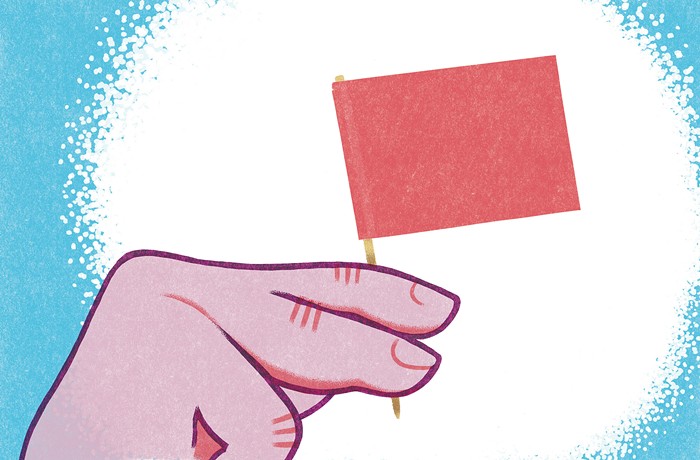I have been seeing sex workers for 30 years, and I shudder to think how shitty my life would have been without them. Some have become friends, but I've appreciated all of them. Negative stereotypes about guys like me are not fair, but sex work does have its problems. Some clients (including females) are difficult—difficult clients aren't typically violent; more often they're inconsiderate and demanding. Clients need to understand that all people have limits and feelings, and money doesn't change that. But what can we clients do to fight stupid, regressive, repressive laws that harm sex workers?
Not A John
You can speak up, NAJ.
The current line from prohibitionists—people who want sex work to remain illegal—is that all women who sell sex are victims and all men who buy sex are monsters. But talk to actual sex workers and you hear about considerate, regular clients who are...
Want to read the rest and get in on the comments? Subscribe now to get every question, every week, the complete Savage Love archives, access to comments, special events, and much more!
I have been seeing sex workers for 30 years, and I shudder to think how shitty my life would have been without them. Some have become friends, but I've appreciated all of them. Negative stereotypes about guys like me are not fair, but sex work does have its problems. Some clients (including females) are difficult—difficult clients aren't typically violent; more often they're inconsiderate and demanding. Clients need to understand that all people have limits and feelings, and money doesn't change that. But what can we clients do to fight stupid, regressive, repressive laws that harm sex workers?
Not A John
You can speak up, NAJ.
The current line from prohibitionists—people who want sex work to remain illegal—is that all women who sell sex are victims and all men who buy sex are monsters. But talk to actual sex workers and you hear about considerate, regular clients who are kind, respectful, and sometimes personally helpful in unexpected ways. (A sex worker friend had a regular client who was a dentist; he did some expensive dental work for my uninsured friend—and he did it for free, not for trade.) You also hear about clients who are threatening or violent—and how laws against sex work make it impossible for sex workers to go to the police, making them more vulnerable to violence, exploitation, and abuse, not less.
There is a large and growing sex workers' rights movement, NAJ, which Emily Bazelon wrote about in a terrific cover story for the New York Times Magazine ("Should Prostitution Be a Crime?" May 5, 2016). Bazelon spoke with scores of sex workers active in the growing and increasingly effective decriminalization movement. Amnesty International recently called for the full decriminalization of sex work, joining Human Rights Watch, the World Health Organization, and other large, mainstream health and human rights groups.
But there's something missing from the movement to decriminalize sex work: clients like you, NAJ.
Maggie McNeill, a sex worker, activist, and writer, wrote a blistering piece on her blog (The Honest Courtesan) about a recent undercover police operation in Seattle. Scores of men seeking to hire sex workers—the men ranged from surgeons to bus drivers to journalists—were arrested and subjected to ritualized public humiliation designed to discourage other men from paying for sex.
"These crusades do nothing but hurt the most vulnerable individuals on both sides of the transaction," McNeill wrote. "The only way to stop this [is for] all of you clients out there get off of your duffs and fight. Regular clients outnumber full-time whores by at least 60 to 1; gentlemen, I suggest you rethink your current silence, unless you want to be the next one with your name and picture splashed across newspapers, TV screens, and websites."
The legal risks and social stigma attached to buying sex doubtless leave some clients feeling like they can't speak up and join the fight, and the much-touted "Nordic Model" is upping the legal stakes for buyers of sex. (The Nordic Model makes buying sex illegal, not selling it. In theory, only clients are supposed to suffer, but in practice, the women are punished, too. Bazelon unpacks the harms of the Nordic Model in her story—please go read it.) But sex workers today, like gays and lesbians not too long ago, are coming out in ever-greater numbers to fight for their rights in the face of potentially dire legal and social consequences.
Clients need to join the fight—or perhaps I should say clients need to rejoin the fight.
In The Origins of Sex: A History of the First Sexual Revolution, which I read while I was away on vacation, author Faramerz Dabhoiwala writes about "Societies of Virtue" formed all over England in the late 17th century. Adulterers, fornicators, and Sabbath-breakers were persecuted by these groups, NAJ, but their campaigns against prostitutes were particularly vicious and indiscriminate; women were thrown in jail or publicly whipped for the crime of having a "lewd" appearance. The persecution of streetwalkers, brothel owners, and women guilty of "[walking] quietly about the street" went on for decades.
Then a beautiful thing happened.
"In the spring of 1711, a drive against 'loose women and their male followers' in Covent Garden was foiled when 'the constables were dreadfully maimed, and one mortally wounded, by ruffians aided by 40 soldiers of the guards, who entered into a combination to protect the women,'" writes Dabhoiwala. "On another occasion in the East End, a crowd of over a thousand seamen mobbed the local magistrates and forcibly released a group of convicted prostitutes being sent to a house of correction."
Male followers of loose women, soldiers of the guard, mobs of seamen—not altruists, but likely clients of the women they fought to defend. And thanks to their efforts and the efforts of 18th-century sex workers who lawyered up, marched into court, and sued the pants off Society of Virtue members, by the middle of the 18th century, women could walk the streets without being arrested or harassed—even women known to be prostitutes.
I'm not suggesting that today's clients form mobs and attack prohibitionists, cops, prosecutors, and their enablers in the media. But clients can and should be out there speaking up in defense of sex workers and themselves. Sex workers are speaking up and fighting back—on Twitter and other social-media platforms, sometimes anonymously, but increasingly under their own names—and they're staring down the stigma, the shame, and the law on their own. It's time for their clients to join them in the fight.
I'm a 26-year-old gay male, and I like to explore my feminine side by wearing female clothes. I have a boyfriend who likes to do the same thing, but he doesn't have the courage to tell his parents that he's gay and explores his feminine side by wearing female clothes. I want to adopt early school-age boys and teach them that they can explore their feminine side by wearing female clothes. My question has two parts. First, in regard to my boyfriend, how can I encourage him to tell his parents he's gay and wants to explore his feminine side by wearing female clothes? Second, in regard to adopting early school-age boys, how do I teach an early school-age boy that it's okay for them to explore their feminine side by wearing female clothes and also teach them that they don't have to be gay at the same time?
Dressing A Future Together
Wear whatever you like, DAFT, but please don't adopt any children—boys or otherwise, early school-age or newborn, not now, probably not ever. Because a father who pushes his son into a dress is just as abusive and unfit as one who forbids his son to wear a dress. You two don't need kids, DAFT, you need a therapist who can help your boyfriend with his issues (the closet, not wearing female clothes) and help you with yours (your extremely odd and potentially damaging ideas about parenting, not wearing female clothes).
Before I sign off: a big thank you to the Dan Savages who filled in for me while I was on vacation—Dan Savage, Orlando-based sportswriter; Dan Savage, London-based theatrical marketing executive; and Dan Savage, Brooklyn-based designer. You guys did a great job!
And here's something clients of sex workers can do without going public: The Sex Workers Outreach Project (SWOP) is running a pilot program to help incarcerated sex workers. Send a book to an imprisoned sex worker, become a pen pal, or make a donation by going to SWOPbehindbars.org and clicking "10 Ways to Help Incarcerated Sex Workers." Non-clients are welcome to help, too! ![]()
Savage Lovecast live in Chicago! Listen at savagelovecast.com.
@fakedansavage on Twitter



















